Essay On Machine
Outline of Essay
- Introduction of Machine
- importance of Machine
- Advantages and Disadvantages of Machine
- World without Machine
- Man Vs Machine
Introduction of Machine
We live in a world that is driven by technology and machine. From the time we wake up to the time we sleep, machines have become an integral part of our lives. Machines are basically tools or devices that make work easier by reducing human effort and improving efficiency. Invented to make daily life simpler, machines have come a long way since the industrial revolution to become more sophisticated and effective. Today, machines are found everywhere from manufacturing to transportation and communication to healthcare.
Importance of Machine
Machines have played a vital role in the progress of human civilization. Manufacturing machines have revolutionized our production processes and made it possible for us to manufacture a variety of goods at a fraction of their original cost. Machines are also used in communication, transportation, energy production, healthcare and other sectors. Machines help us get work done faster and more efficiently, thus saving time and energy. They also provide us with better results than manual labour. Thanks to machines, we now have access to a larger variety of products, increased production capacity and shorter waiting times for services such as healthcare.
Advantages of Machine
The advantages of machines are many.
Machines are capable of performing tasks that humans cannot do on their own. For instance, heavy duty machines such as bulldozers and excavators can perform large scale tasks like moving mountains and digging ditches with ease.
They help to reduce the cost of production by reducing labour costs and increasing efficiency. They help to reduce the risk of human errors. Machines can be programmed to perform tasks with precision and accuracy, thus eliminating the possibility of human errors.
They are capable of performing repetitive tasks in a fraction of time it would take a human to do so. This helps to increase production speed and efficiency.
They also help to reduce the need for manual labour, thus freeing up people from tedious and back-breaking work.
They also help to reduce wastage and increase efficiency by ensuring that products are manufactured in the most cost-effective manner. Finally, machines have also helped to reduce the risk of accidents and injuries by replacing hazardous manual labour with automated processes.
Disadvantages of Machine
Machines can be expensive, especially if they are sophisticated and require specialized parts and maintenance.
Machines can also be difficult to operate, requiring the expertise of a trained professional. They can also create a sense of dependency for humans as machines become more capable. In some cases, machines may even replace human labour, potentially leading to job losses. Machines also require a lot of energy to operate, thus leading to an increase in electricity bills.
Finally, machines can also be prone to breakdowns and malfunctions, leading to costly repairs. They also require regular maintenance, which can be costly and time consuming.
World Without Machines
A world without machines would be drastically different from the one we live in today. It would be a world where manual labour was more prominent, and human effort replaced machine power for all tasks. This would lead to an overall reduction in efficiency and productivity, as manual labour is often slower and less reliable than machine-powered processes. It would also lead to an increase in costs and a decrease in quality, as machines are able to produce items with greater precision than humans can. In addition, the process of manufacturing goods would be much slower, leading to increased wait times for products and services. Finally, it could potentially lead to an increase in unemployment rates, as many jobs that are currently done by machines would no longer exist.
Overall, while machines have brought a great deal of convenience and efficiency to our world, they are not without their drawbacks. As such, it is important for us to consider the implications of using machines before replacing manual labour with them. We must also be aware of the potential problems that could arise from a world without machines, and take steps to mitigate them.
Machines have changed the world for the better in many ways. They have made tasks simpler and more efficient, allowing us to produce goods and services quickly and with greater precision than ever before. However, there are also potential drawbacks that come with using machines, including the cost of implementation and maintenance, as well as the potential for job losses due to automation. As such, it is important for us to be aware of the pros and cons of using machines, in order to make informed decisions about our use of them.
Man Vs Machine
The debate of man vs machine has been around for a long time. While machines have become more capable, people still remain the most valuable asset in any organization. Human beings are capable of making decisions and using their creativity to solve complex problems. Machines, on the other hand, can only do what they are programmed to do;they lack the ability to think for themselves.
At the same time, machines are becoming increasingly important in many industries, as they are capable of providing a level of speed and efficiency that cannot be matched by human labor. Ultimately, businesses need to determine which tasks should be automated or done manually depending on their particular needs and goals. Although machines may appear to offer more efficiency and cost savings in the long run, it is important to weigh the pros and cons carefully before making any decisions.
Ultimately, both humans and machines have their own unique benefits and drawbacks. Machines can bring efficiency and cost savings, but they also come with certain risks such as job losses due to automation. On the other hand,
FAQs
What are the four functions of a machine?
The four main functions of a machine are: to reduce the amount of work needed to perform a task, increase productivity, reduce costs associated with production, and improve the quality and accuracy of results.
What are the principles of machines?
The core principles of machines involve forces, energy and motion. In order to make a machine work correctly, these three elements must be balanced in an efficient manner. The key components of machines include gears, levers, pulleys and other mechanical parts.
What is the efficiency of a machine?
The efficiency of a machine is the ratio of useful energy output to total energy input. For example, if a machine outputs 100 joules of useful energy and required 200 joules of energy input to do so, its efficiency is 50%.
Download Pdf of Essay On Machine
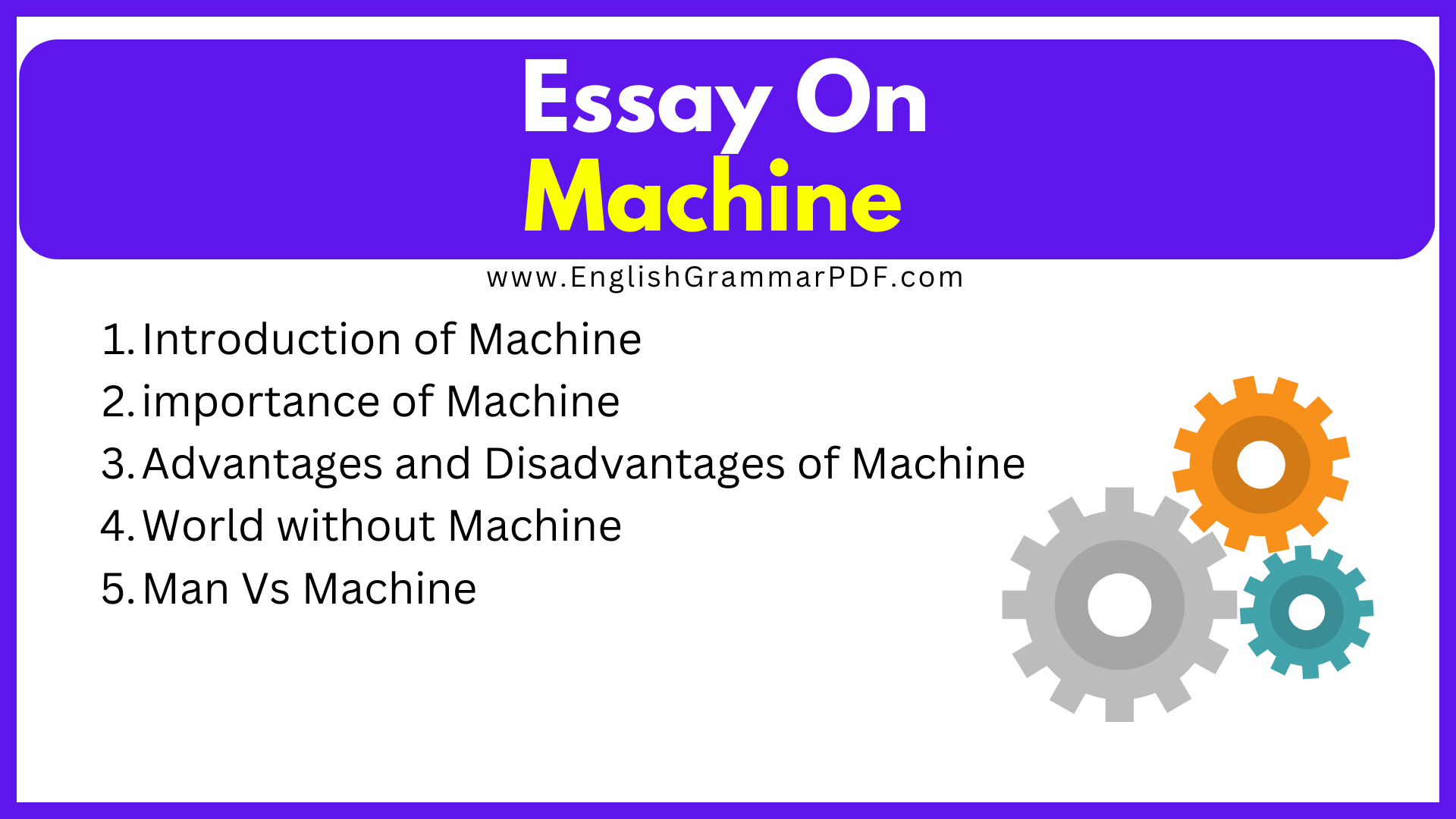
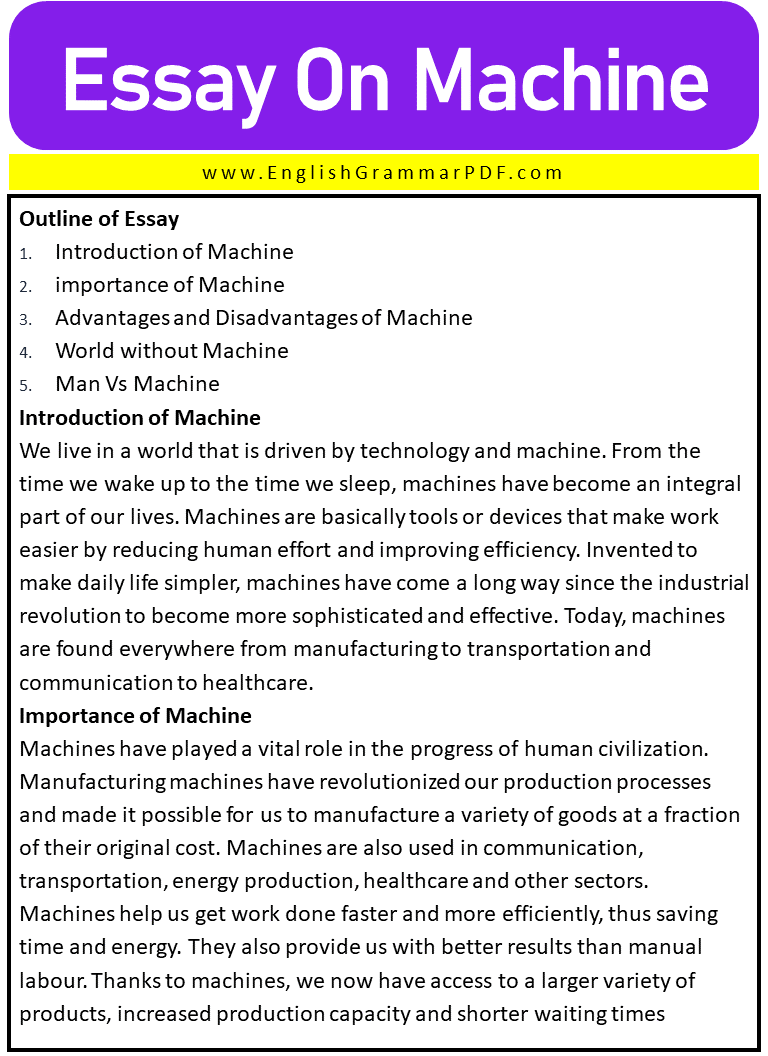
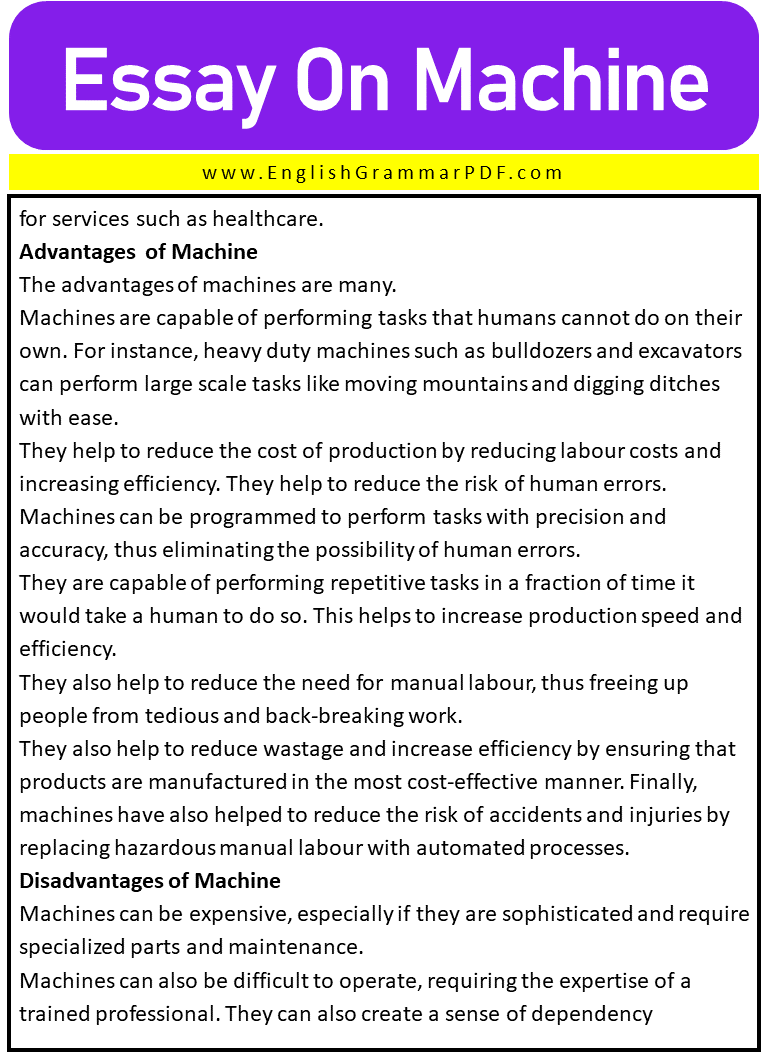
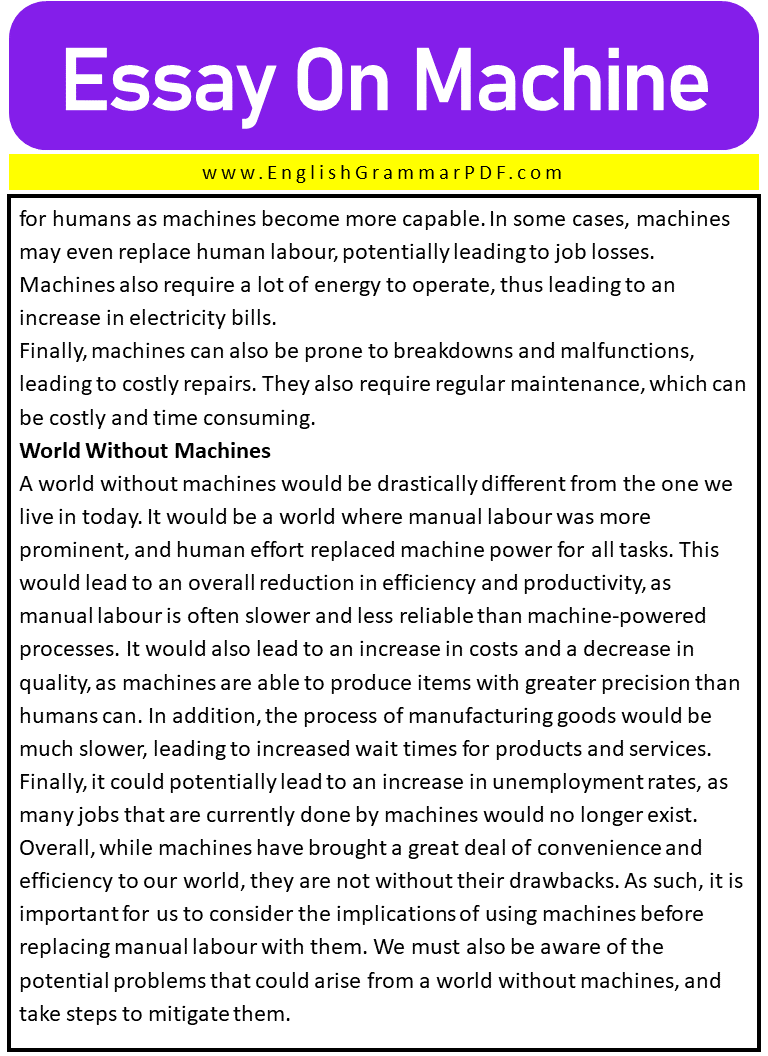
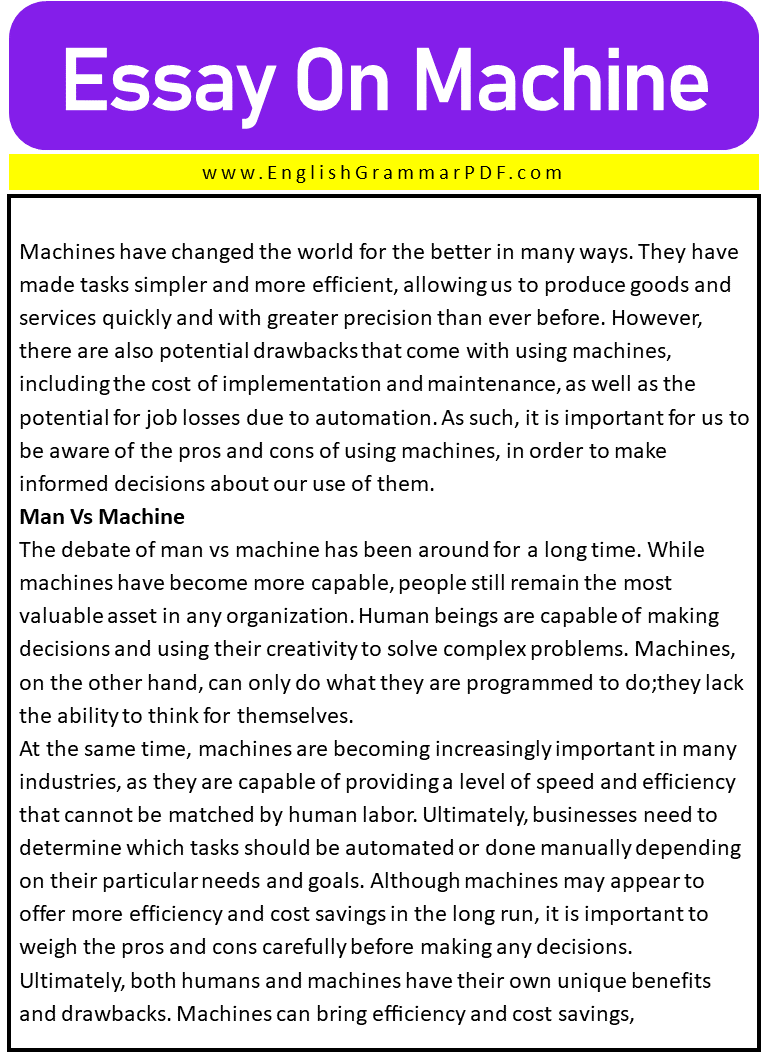
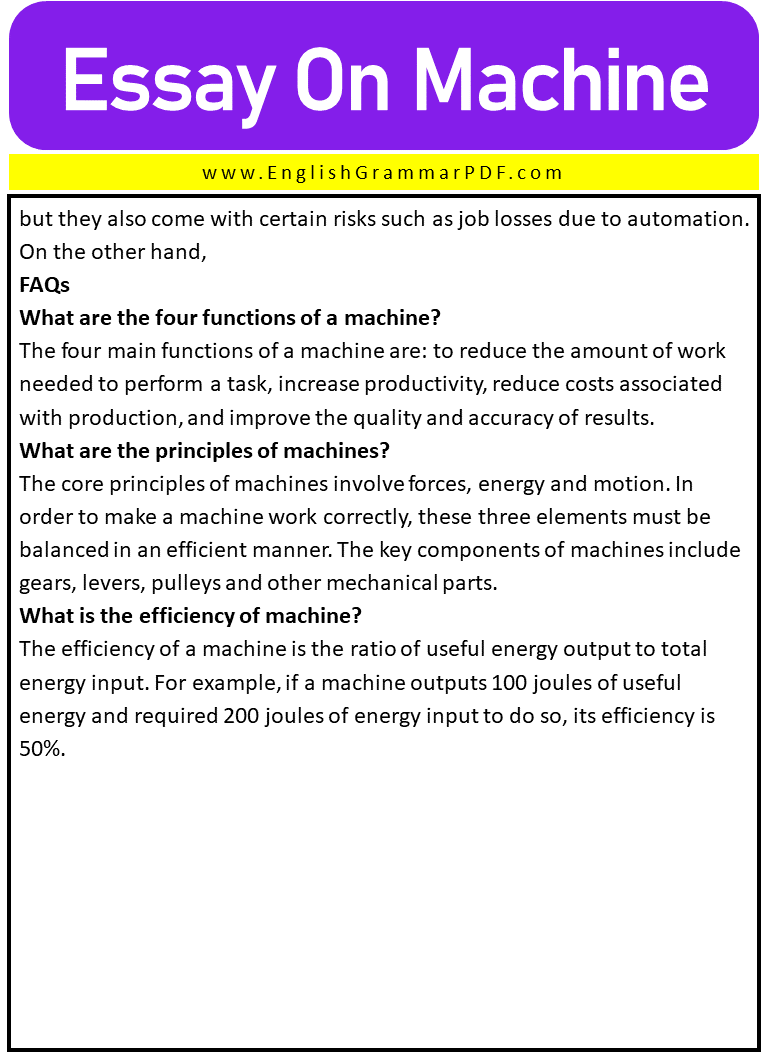
More Essays:


